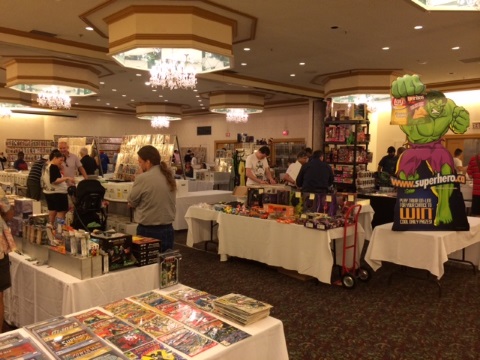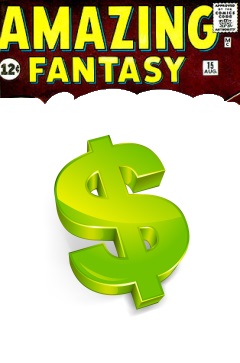Since starting Comictrend a year ago and my By the Numbers column for comicbookdaily.com, I’ve received a few emails from new collectors asking for a “collecting 101” guide. With thousands of titles spanning over 70+ years, the hobby can be a bit overwhelming to newcomers.
There’s no black and white blueprint to follow. Each collector has to figure out what works for them, keeping in mind their budget and the time they have available to devote to the hobby. At the end of the day, the best collection isn’t the biggest or most valuable; it’s the one you’ve assembled with care, consideration, and joy. This is going to be different for each person.
Right off the bat, one should throw out any notion of getting rich. Don’t buy a comic just because you think it will go up in value. The reality is that there are way more examples of hot comics crashing and burning than making anyone rich. In fact, if you think about all the comics that have ever been produced, the reality is that the vast majority of them are near worthless. Think about comics as a hobby first and investment alternative second. The #1 goal is to have fun. If your collection grows in value after 20 years of collecting then that’s icing on the cake. But if you really want to make money over the long run then you’re better off contributing to a solid investment portfolio.
1) Find your passion.
Why are you even interested in comic books? Do you enjoy the artwork? Did you grow up watching Saturday morning X-Men and Spider-Man cartoons? Perhaps when you were younger you were drawn to the classical heroic archetypes from the Golden Age… or maybe the grittier Batman, Wolverine, and Punisher books of the Bronze and Copper Ages.
Find the source of your passion. This should be the cornerstone of your collection, your launching point. If you start collecting for any other reason (e.g., buying what’s hot at the moment, classic titles that others have said you need to own), your collection will be devoid of any meaning. After all, with unlimited funds all the great historical books could be bought in an afternoon with a few clicks of a mouse. The real fun and enjoyment comes from building a collection of books that means something to you.
This is what’s unique to comics: behind each cover are characters and stories that have a far and wide cultural reach. There are also the story lines, heroes and villains that speak to you on a very personal level. Having a collection means owning a piece of history. What part of this history speaks to you?
2) But don’t get stuck.
I got stuck early on. Like many, I’m huge fan of Claremont’s X-Men run. So naturally I gravitated to Claremont’s classic X-Men stories such as Days of Future Past and Claremont co-created characters such as Sabretooth, Rogue, Psylocke, and Emma Frost.
There were two problems with my myopic fixation on Claremont X-Men. First, most of these titles were launched in the Bronze and Copper Ages (1970 – 1985 and 1985 – 1991, respectively). So my collection became heavily tilted to a specific Age. Second, my enthusiasm for collecting waned after I explored Claremont’s run to its fullest. At the time, I didn’t care about Silver Age X-Men stories or keep up with the latest X-Men books. My comic book world was very narrow.
To coin a phrase, I had “collector’s block.” So I really had to re-think my approach to collecting: was I a fan of Claremont or the X-Men? Bronze Age X-Men or the Bronze Age in general? Why didn’t the Silver Age appeal to me? Was I just ignorant?
I opened up my eyes and did some more research on the Bronze Age era and the Silver Age X-Men that came before Claremont’s run. Like water through a broken damn, my collecting universe exploded. I slowly began to appreciate—and fall in love with—other books from other eras just as much Claremont’s work.
Doesn’t this conflict with rule #1: Find your passion? No, not at all. It’s about finding a core passion and spring-boarding off of it so that the hobby remains fresh and exciting. And it’s not about expanding your collection just for the sake of collecting. It’s about re-discovering the feeling you had when you first started collecting.
3) Go the CGC route.
Yup, love it or hate it, “slabbing” is here to stay. There are three main reasons I recommend buying CGC graded books:
1) You can focus on collecting instead of worrying whether or not that “near mint” book you bought is actually “very good” because it has a rough corner you didn’t notice at purchase.
2) The graded market is much more transparent. CGC tracks the number of books slabbed at each grade making it easy to see the supply and demand picture. Sites like GPA and Comictrend track auction results and market values so you can easily see what the going rate is for the book you want to buy. If you want to buy a 9.6 Amazing Spider-Man #300, within minutes you can figure out what it has been trading for recently.
3) Graded books can be bought and sold much easier. There are now many auction sites that list thousands of CGC graded books. If you have to sell a title in a pinch, there are many eager collectors ready to take your graded book off your hands. Selling a collection of raw books can be tough, especially online.
Don’t get me wrong, there’s absolutely nothing wrong with buying ungraded books. A collection of ungraded books is not inferior in any way to a collection of books wrapped in rock hard plastic. It’s about convenience and peace of mind. Going the slabbed route takes away much of the stuff that makes new collectors (and even veteran collectors) nervous: figuring out grades, market values, supply and demand, etc.
4) Think core and periphery.
Once you’ve established what story lines, characters, artists, writers, etc., that are going to form the core of your collection, develop a list of key historical titles—first appearances, first issues, character defining storylines, etc. These are likely the books you’re passionate about, anyway. These key titles will form the core of your collection. Around this core collection you can build a collection of lesser known titles, Modern Age variant covers, Signature Series books, and complete runs. The bulk of the value of your collection will come from the core (key) titles while the peripheral books will round out your collection and allow you to explore the off-the-beaten path titles.
Here’s the harsh reality: beyond a list of a couple hundred or so key books, most comic books don’t have any real value. Again, follow your passion. But keep in mind that as you stray from the keys, values drop exponentially and the market becomes very thin.
5) Consult price guides and data aggregators.
There are two, distinct resources for comic book values: guides and transaction-driven online databases. Guides are perhaps the most common as they have been around the longest and are seen as the rational, thoughtful source for values that aren’t influenced by fads or market values. This is where the iconic Overstreet Price Guide (around since 1970) fits in.
As auctions moved online, a newer type (relative to the 40 year old Overstreet guide!) of price guide emerged. These guides download data from the major auction sites (eBay, Comiclink, Heritage, etc.) and aggregate the data. The most well-known site by far is GPA. Here you won’t find the relatively static values seen in Overstreet. There aren’t any industry veterans sitting around debating values. These sites generate their ‘values’ strictly from transaction data alone. For example, for each book GPA provides average values for 2010, 2011, the last 12 months, and the last 90 days. At Comictrend we define the value of a comic book as the median price of the last 8 transactions.
I suggest collectors use both, keeping in mind each approach’s strengths and weaknesses. Price guides are the calm voice during speculative runs. Overstreet advisors have dozens of years of experience and have seen it all. There is much thought and considering behind each value in the book. On the other hand, these guides can seem a bit stale in today’s fast moving environment. Often people just want to know what is the book trading for right now? This is where the data aggregators will help you.
6) Discuss and keep ahead.
Hit the web. Lurk or join forums. Visit the top collecting sites and read what the most experienced collectors are saying.
What would your collective advice be to a newcomer?




Well I disagree with the majority of comics are worthless.It’s the politically correct thing to say to like something for what it is and not for the money. Tell that to the people that bid for the high end slabbed comics. Anyone that doesn’t have deep pockets are out of luck in this bidding. Newer comics probably are not going to increase well in value unless there is some scarcity. It all comes down to supply and demand. Personally, I like collecting things that nobody else collects. How about romantic comics from the 60’s and 70’s ? These probably didn’t sell as much as DC comic staples like Batman and Superman, but if less were made and even less were kept in excellent condition, there probably are very few in high grade. There can be niche markets in comics.
This is a great write up. Well done.
RJ, I’m blown away by the amount of energy you put into comictrend.com. Can I assume you input all that data manually since each chart seems to be an image…? The new design is a vaaaast improvement and a step in the right direction…
Stellar post RJ!
You are so right, comic collectors should focus on having fun! The great part is that while amassing a comic book collection we’re also amassing a collection of experiences and memories – and friendships.
I have a small personal collection and I swear each book in it takes me back to the year and place I bought it, the person I bought it from etc. These are some very important memories for me and in reality these memories are worth more than the comics. I swear I could not make up the eccentric cast of people nor the off the beaten path places I’ve experienced in my quest for comic books on my want list!
I’ve had dogs bite me and I’ve had police tell me not to go there (after I asked for directions). A guy started yelling at me and kicked me out of this house (after an offer what in hindsight may have been a little low). Once up north I rummaged through a shed that had comics that all smelled of raccoon piss, I even spent a couple of hours once de-bagging a box of comics outside so none of the termites would make it into my basement. Once I spent about 15 minutes looking at a guys books then we spent the next 4 hours having beers and talking old comics, we still hang out now and again. I swear there was another guy that got teary eyed after he sold me his comics, the books meant a lot to him but unfortunately money meant more at that point.
I could go on but honestly any collector that is passionate about collecting comics can surely write a book of his or her exploits in their pursuit of those elusive issues.
Hi Ed,
Here’s my point with the “majority of comments are worthless” comment. Think about the current popular X-Men or Batman books. They sell about 150,000 copies per month. The industry in total sells 70-80 million books a year. Of these 70-80 million books sold, the vast majority–perhaps 90%–will be worth essentially their cover price 5 – 10 years from now. Selling a large collection of any of these books will almost be impossible. You’d be lucky to find a dealer to take them off your hand at a rate of 50 cents a pound.
Another example: the collecting community does not care about Spider-Man #301 – #360 (the gap between the first appearance of Venom and the first appearance of Carnage). So let’s say that each Spidey comic between #301 and #360 had a print run of 100,000 copies – that’s a total of 6,000,000 comics published. Let’s assume #300 and #361 also had 100,000 print runs (although #361 would in reality be higher). That’s 200,000 copies of #300 and #361. So that’s 3% of the total Spidey run between #300 and #361 that has any sort of collector value.
Thanks Charlie! Glad you like the new redesign!
Everything is done manually. I comb through all the comic transactions by hand (er, by mouse clicks). One day I’d definitely like to hook up with a programmer to figure out a way to make it more automated. Until then it’s a labor of love!
Thanks Walt. Yeah, I hear you with the stories. One of my favourite memories I have as a child is my Mom driving me 40 minutes to the big flea market in London, Ontario (it used to be purple, not sure if it still is) to get comics. She would take me every other weekend or so and never complained. I’m not sure what she thought of all the ‘interesting’ characters I would talk to at the market.
There were 3 or so comic vendors there. They would hang the valuable Silver/Bronze age stuff up high. I can still picture all of these books staring down at me, out of my grasp both physically and financially. Every time I buy a somewhat valuable book now I think of those once out of reach books and am overcome with emotion.